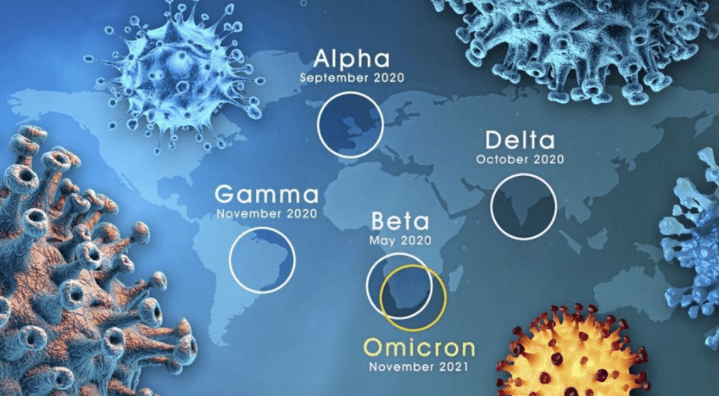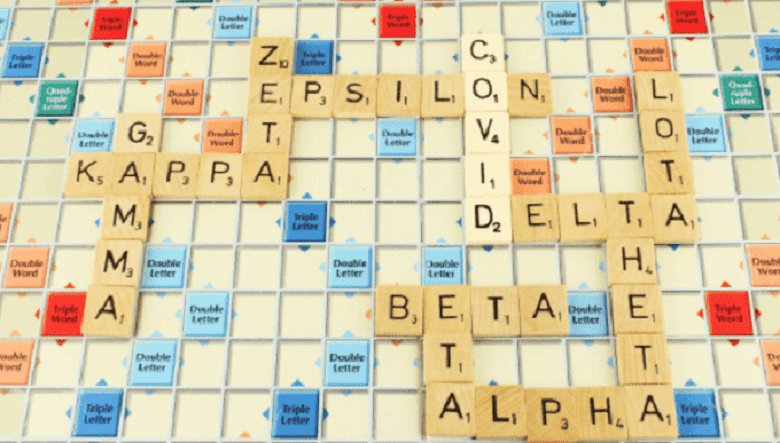It seems likely at this point that the coronavirus variants of significance will outnumber the twenty-four letters of the Greek alphabet at some stage. Then what?
And what, by the way, is this penchant for using Greek to designate disasters?
An unusual side effect of the coronavirus is the regular appearance of the Greek alphabet in newspaper headlines. The highly contagious Omicron variant has broken through in more ways than one: the Greek alphabet has made it into the Style section.
What is this penchant for using Greek to designate disasters? During hurricane season, if meteorologists use up the approved letters of the English alphabet, they have traditionally turned to Greek for naming storms. In recent years, we got as far as Hurricane Iota. During the pandemic, scientists with the World Health Organisation are relying on Greek to make the variants of the coronavirus easier to talk about and to avoid associations with the names of places where the variants were initially detected. For instance, the strain with the designation B.1.617.2, which was first identified in India, is popularly known as the Delta variant. Although it was unlikely that, even with global warming, a single hurricane season could yield enough storms to run through both alphabets, the pandemic threatens to deplete our store of Greek in no time. Having reached omicron (ο), we are already more than halfway through the alphabet.
If this seems to be happening too fast, it’s partly because scientists have skipped some letters. They got to mu (μ), which is right in the middle, and then left out nu (ν), because it sounds confusingly like “new”; we can’t go around talking about a new Nu variant of interest. They also skipped the next letter, xi (ξ), not because it looks so exotic, sitting there between “N” and “O,” but because Xi is a Chinese surname and, one cannot help but notice, the surname of the guy who runs China.
A guest on the US radio quiz show “Wait Wait … Don’t Tell Me!” recently opined that Americans do not take Greek seriously – it just sounds “goofy.” He may have a point: Greek is the language of math and science, but it has also been employed in science fiction. After omicron comes pi (π), the one Greek letter that people remember from high-school geometry. The Pi variant sounds like an alternative dessert in the cafeteria. But there are not many letters left, and they all sound serious: only rho (ρ), sigma (σ, ς), and tau (τ) stand between us and upsilon (υ), which is the beginning of the end.
Just as the English alphabet groups the three crazy letters – “X,” “Y,” and “Z“ – at the end, Greek saves some very special characters for last. Upsilon is followed by three letters whose order nobody can keep straight: phi (φ), chi (χ), and psi (ψ) – or is it chi, psi, and phi? Fie on the Phi variant. Chi could be trouble. It is, after all, the first letter in “Christ,” and zealots may interpret a Chi variant as the Second Coming. The Psi variant will sound like “sigh”; psychiatrists may need to revise the DSM to reflect its symptoms.
Finally, here comes omega (ω). Everybody knows it signals the end. Although we are still near the middle of the alphabet, albeit on the downhill side, people are noticing that Greek has two “O”s. Omega means “big O.” (Get it? O-mega?) Omicron means “little O.” O-micron. The Greek micro, or “small,” has given us “microbes,” “microscopes,” and “microminis.” Mega, Greek for “big,” has come into English in “Mega Millions”, “mega-threat,” and “megalopolis.” If the repercussions from little old omicron have been so catastrophic, what are we to expect from big bad omega?
Before panic sets in, a note on pronunciation: “small O” and “big O” refer less to the size and shape of the written letters (omega is an omicron with big feet: Ω) than to their sounds. They are vowels with short and long values. Though there is no universal agreement about it, many American classicists pronounce omicron with a short “o,” as in “om,” and omega with a long “o,” like an Irish surname: O’Mega.

It seems likely at this point that the variants of significance will outnumber the twenty-four letters of the Greek alphabet at some stage. Then what? Will scientists loop back to the beginning and reuse the letters, perhaps with a numerical suffix? Alpha-2, Beta-2, Gamma-2, kαι ta λοιπά? (That’s Greek for “and the rest.” Come on, get with the programme!) But wait – because they are concerned about confusion, and because we already have omega-3 in “omega-3 fatty acids,” they may have to leap over numbers the way they did over letters. Or probably switch to Arabic.
Author of this article is Mary Norris, journalist at The New Yorker,
published on www.newyorker.com, 26 December 2021
![]()




